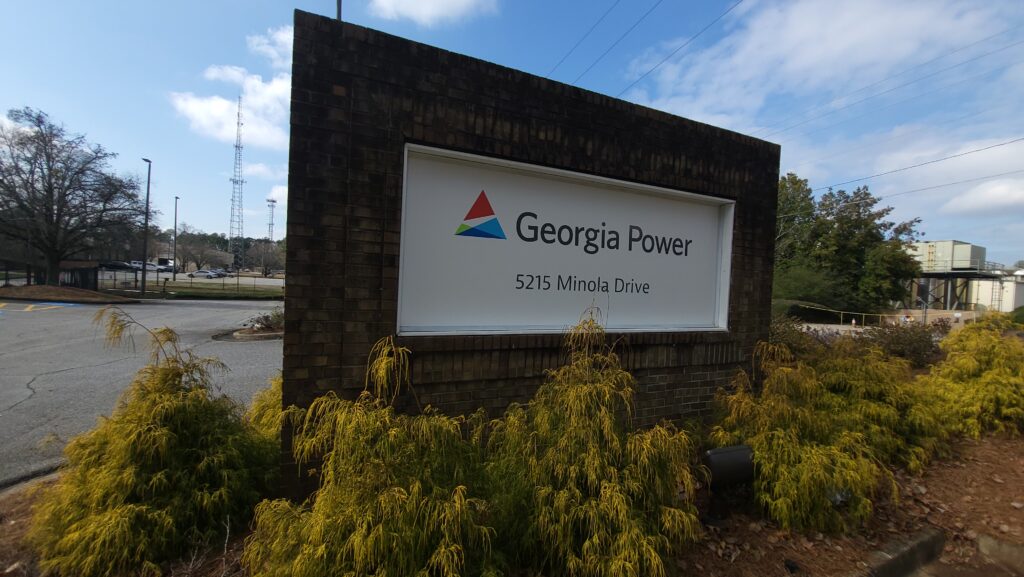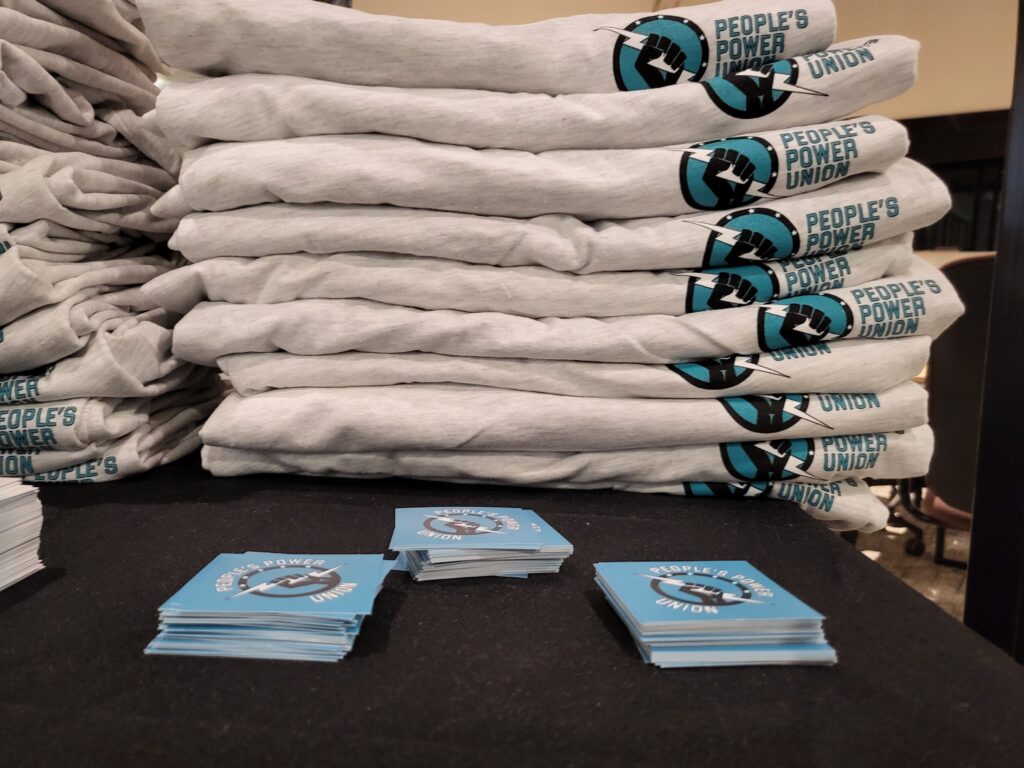In 2005, amid budget cuts, the Metropolitan Atlanta Rapid Transit Authority proposed raising bus fares and eliminating two routes passengers used to get to Bowen Homes. The city responded in the form of the Atlanta Transit Riders Union. The ATRU organized and, through extensive community efforts, thwarted the fare increase, and the transit authority reinstated an amended version of the route.
Starting in 2022, Georgia Power has instituted six bill increases for ratepayers who have seen an average of 45 dollars added to their monthly statements. Georgia Power is the largest utility provider in the state, servicing nearly 3 million Georgia residents. With most of its customers falling into the state’s working class, the increases in energy costs could result in Georgia families making tough decisions while juggling rises in other living costs.
This workers-led, consumer-first mindset is at the heart of the People’s Power Union and its agenda — led and birthed by organizers with the GCV Education Fund Neil Sardana and CiCi Arriaga.
“As users of these essential services, we are also workers,” Sardana told The Peach Pit. “We are akin to what the labor movement has been in this country – building power to take collective action and hold those with greater power responsible and to meet the needs of everyday working people.”
The PPU held a virtual launch party over Zoom on January 25th to mark the debut of its organized front against the monopolization of energy resources in Georgia. On January 30th, the Union held an in-person starting event where prospective members could hear more about the Union’s plans.
Members of PPU will take direct actions in “holding the Georgia PSC and GA Power accountable, building an alternate vision for Georgia’s energy Future, speaking out for affordable clean energy, and flexing consumer muscle headed into the elections for the Public Service Commission (PSC) in the spring ‘25.
“Workers in this state and [in Atlanta] have such an important role in this whole process,” Sardana said, explaining his reasoning behind organizing the union. “Whether it’s the people who work for Georgia Power, maintaining the lines … or the workers who live in these homes, who consume this electricity to provide for their families.
[W]e are all workers, we are all dealing with these concerns in our daily lives, so [our hope is] to build alliances to address these common issues together.”

In the continuum of Rose V. Raffensperger
As defined by the United States 11th District Court, the PSC is an “administrative body” that, among regulating certain functions of Georgia Power, like setting customer rates, performs “quasi-legislative and quasi-judicial functions.” Commissioners on this regulatory board are either elected by a state-wide election to one of five districts or appointed by Governor Brian Kemp. In July 2020, the executive director of the GCV Education Fund, Brionte McCorkle, then president of the Georgia NAACP, James Woodall, and president of the Atlanta NAACP, Richard Rose, filed suit alleging that how the state votes for PSC officials drastically siphons the voting power of those who need the vast powers of the commission the most – namely, Black working-class Georgians.
2022 PSC candidate for District 3, a district at the time of her campaign consisting of 52 percent Black residents, Lindy Miller, testified in the case and spoke to the relationship between Georgia ower and Black ratepayers, saying that she did not have faith in commissioners to “openly advocate or highlight issues that were important to Black communities, like energy burden or reducing the fees customers were being charged in connection with Georgia Power’s construction of nuclear power facilities.”
In her PSC bid, Miller won every county in her intended district, Clayton, Dekalb, and Fulton, but ultimately lost in the statewide election.
Justice Steven D. Grimberg wrote in his August 2022 opinion that “[the state-wide] method of election unlawfully dilutes the votes of Black citizens under Section 2 of the Voting Rights Act of 1965 and must change.” The defendants ultimately appealed against this decision, and the case awaits resolution.
In talking to TPP, Sardana explains that the PPU directly connects its inception to the groundbreaking lawsuit’s intended goal of injecting equity into the PSC mold.
“This [union was created] to do the same thing in bring[ing] people together and provide them with additional information and education about how the PSC works, what relationship they have to Georgia Power and other utilities, and what role do they [as electors] play in either electing [commissioners] or holding them accountable and making their voices heard.
…[T]he PSC’s job is to represent the interests and needs of the public when it comes to [energy and utility] decisions. Having voices in our state so diluted within the process makes it so that the people don’t have as much access and input as they would have had people been elected on a district basis.”
Consumer Power as a fundamental Black, working-class issue

“Even absent the [Rose] case, you can talk to anybody; I can go to [the grocery store] right now and talk to people about their frustrations with their power bill,” Woodall told TPP. “I don’t know too many people who are happy having to pay more. Particularly when you talk about working-class people with fewer resources and more expenditures, how do we deal with that?”
During her deposition in Rose, Miller drew attention to economic data that suggests there are “many more low-income Black ratepayers than high-income Black ratepayers and a disproportionate number of low-income Black ratepayers relative to low-income White ratepayers in Georgia.”
In their report, “Energy Burdens of Black Households in Georgia,” the Sierra Club cites similar research that highlights the throughline of inequity suffered by Black communities in the state intersects with their power needs. “The impact of poverty on education, of sub-par education on income and of low-income on energy burden forms a vicious cycle,” the report says.
Students in Georgia’s Black Belt counties are twice as likely to lack access to high-speed internet than students in the other parts of the state. Lack of access to quality education and to other resources hinders the students’ chances of getting better incomes, which in turn increases the likelihood of their facing higher energy burdens.”
At its inaugural event in January, the union printed one-pagers for guests outlining its commitment to “put forward [its] alternative to [Georgia Power’s] long-term vision.”
“Just like MARTA is providing an essential service for people who need to get from point A to point B and rely on that system for their daily transportation needs, we have a similar kind of relationship here with Georgia Power,” Sardana explains.
“They’re a monopoly, so we’re essentially stuck with them. How do we come together to make the best of the situation where this very wealthy monopoly corporation … is held accountable to the needs of everyday working people, folks who are … now having to make hard decisions about whether they can afford to pay their light bills and keep their lights on.”

Daniel Richardson
Daniel Richardson is the managing editor of The Peach Pit. The formative years of his career were rooted in people-centered news coverage, particularly in the Atlanta and metro areas. His work has appeared in the Covington News, The Georgia State Signal, and others. After graduating from Georgia State University, he transferred his scholarship in Black, diasporic studies in movement journalism.

0 Comments